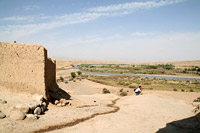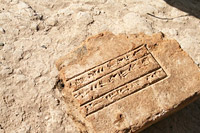The Netherlands organisation for Scientific Research NWO has granted a subsidy to prof. dr Wilfred H. van Soldt (Humanities, LIAS) and dr Diederik J.W. Meijer (Archaeology, Near East) to conduct a pilot excavation in Iraqi Kurdistan.
During an archaeological surface survey in 2008 prof. dr Wilfred H. van Soldt and dr Diederik J.W. Meijer found a site which yielded a cuneiform inscription identifying it as the town of Idu, dated to the 12th century BC. The site is situated on the Little Zab, a tributary of the Tigris, close to the present Iraqi-Persian border.
The excavations are planned for April-May, and will be conducted in cooperation with the universities of Leipzig and Iraq’s own Erbil (Hawler). The project’s primary aim is to establish a pottery sequence for this area which hitherto is a virtual archaeological terra incognita, but possibilities for further research, possibly incorporating a wider scope of cooperation, will also be explored. On the occasion of an earlier visit to Iraq in 2006 a Memory of Understanding was agreed upon and signed between


